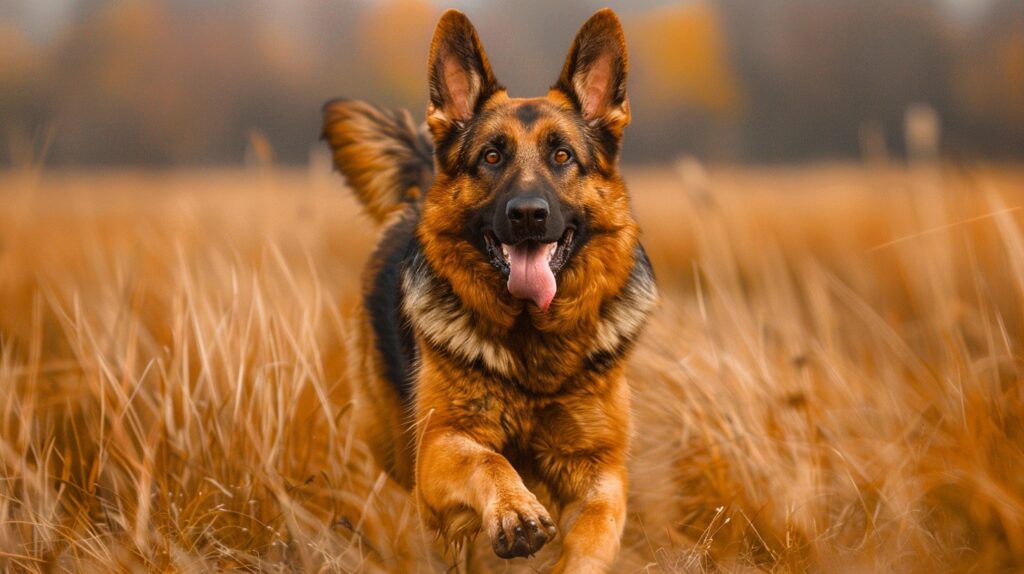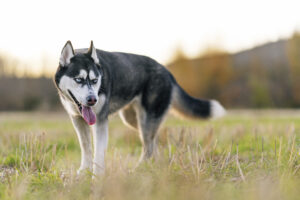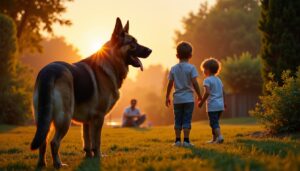Introduction
When looking for a loyal, intelligent, and versatile canine companion, many prospective dog owners immediately think of the German Shepherd. These iconic dogs have earned their reputation as one of the world’s most popular breeds for good reason. However, there are several other remarkable dog breeds like German Shepherd that deserve equal consideration – and in some cases, might even be better suited to your lifestyle and needs.
German Shepherds set a high bar with their combination of intelligence, loyalty, and versatility. Originally bred for herding and farm work, these dogs have transitioned successfully into roles as diverse as police work, search and rescue, service animals, and beloved family pets. Their distinctive appearance, with erect ears, athletic build, and that classic black and tan coloration, makes them immediately recognizable worldwide.
But what if you love the essence of what makes German Shepherds great, but need something a bit different? Perhaps you’re looking for dog breeds similar to German Shepherd but with fewer health concerns, or breeds like German Shepherd but smaller for apartment living. Maybe you’re interested in German Shepherd alternatives that shed less or have different energy requirements.
In this comprehensive guide, we’ll explore four exceptional dog breeds like German Shepherd that offer similar positive traits while potentially being even better fits for certain homes and lifestyles. We’ll compare their appearances, temperaments, training needs, and health considerations to help you find your perfect canine companion among these German Shepherd type dogs.
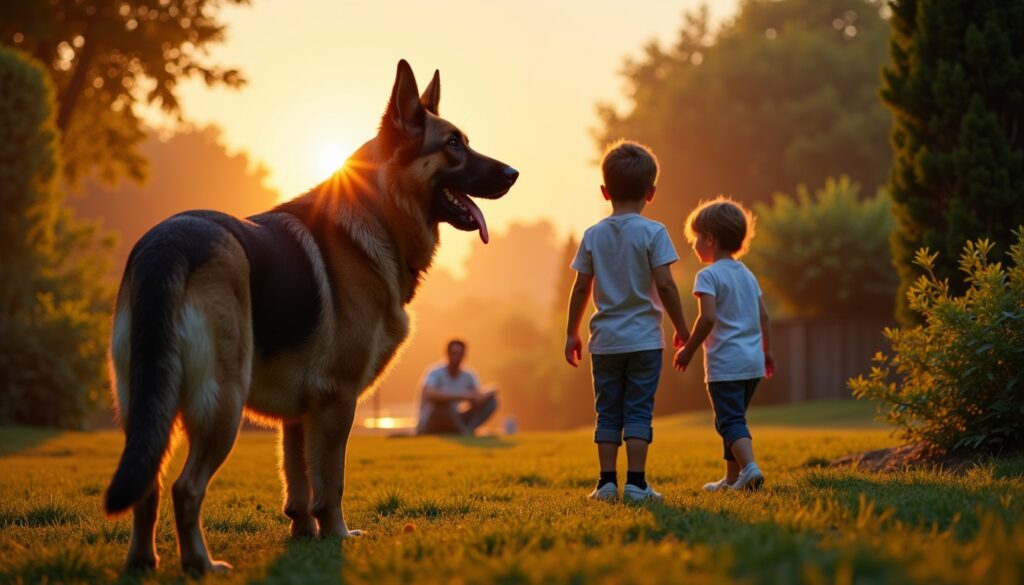
What Makes German Shepherds Special
Before we dive into German Shepherd alternatives, let’s establish what makes German Shepherds themselves so special. Understanding these core traits will help us identify what to look for in dogs like German Shepherd:
- Intelligence and Trainability: German Shepherds consistently rank among the most intelligent dog breeds. They learn commands quickly and excel in obedience.
- Loyalty and Protective Nature: Few breeds match the German Shepherd’s legendary loyalty and natural protective instincts.
- Versatility: These dogs can adapt to various roles, from working dog breeds to family companions.
- Athletic Ability: German Shepherds possess impressive strength, endurance, and agility.
- Appearance: Their noble appearance with erect ears, balanced proportions, and distinctive coloration sets them apart.
Now, let’s explore four outstanding dog breeds like German Shepherd that offer these qualities with their own unique advantages.
1. Belgian Malinois: The Intense Performer
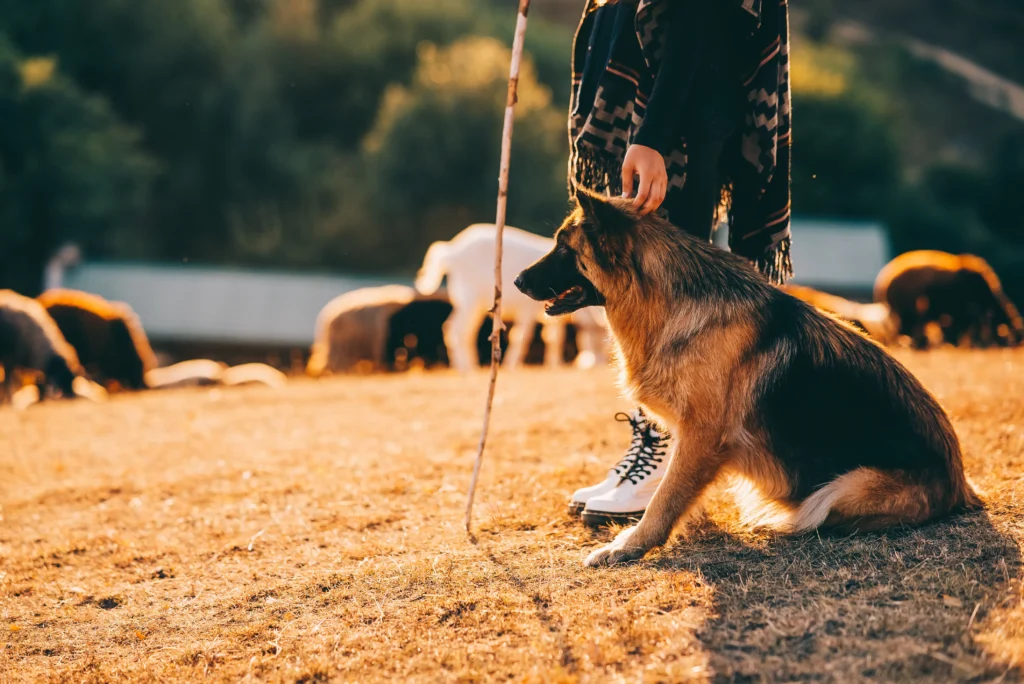
When discussing dog breeds similar to German Shepherd, the Belgian Malinois often tops the list. These dogs are so similar in appearance that they’re frequently mistaken for German Shepherds, but they offer some distinct advantages.
Physical Characteristics
The Belgian Malinois is slightly smaller than the German Shepherd, with a German Shepherd size comparison showing Malinois typically weighing 40-80 pounds compared to the German Shepherd’s 50-90 pounds. They have a similar athletic build but tend to be lighter-boned and more agile. Their coloration is typically fawn to mahogany with a black mask and ears.
Like other shepherd dog breeds, the Malinois sports erect ears and an alert expression. Their coat is shorter than the German Shepherd’s, resulting in less shedding – a significant advantage for many homes.
Temperament and Personality
The Belgian Malinois is perhaps the most intense of all dog breeds like German Shepherd. They have even higher energy levels and drive, making them exceptional working dogs. Law enforcement and military units increasingly choose Malinois over German Shepherds for their:
- Extraordinary agility and athleticism
- Intense focus and work ethic
- Slightly smaller size allowing for easier handling and transportation
- Generally better health profile with fewer inherited issues
For families considering dog breeds like German Shepherd for families, the Malinois can be an excellent choice, but with important caveats. These dogs require extensive mental and physical stimulation – even more than German Shepherds. They’re not suitable for sedentary households or first-time dog owners. However, for active families committed to training and exercising their dog, the Malinois offers unparalleled loyalty and performance.
Training and Exercise Needs
Among working dog breeds like German Shepherd, the Malinois has perhaps the highest exercise requirements. They need:
- 2+ hours of vigorous physical activity daily
- Regular mental stimulation through training, puzzles, or work
- Consistent, reward-based training from an experienced handler
Belgian Malinois excel in dog sports like agility, protection work, tracking, and obedience competitions. Their intense bond with their handlers makes them incredibly responsive to training when proper methods are used.
Health and Lifespan
One area where the Malinois clearly outshines among German Shepherd alternatives is health. They typically live 12-14 years, noticeably longer than the German Shepherd’s 9-13 years. They’re less prone to hip and elbow dysplasia, though these conditions can still occur.
The Malinois has fewer issues with degenerative myelopathy, a debilitating spinal cord disease common in German Shepherds. Their straighter back conformation (compared to show-line German Shepherds) contributes to better long-term mobility.
Is a Belgian Malinois Right for You?
Consider a Belgian Malinois if you:
- Are experienced with high-drive working dogs
- Lead an extremely active lifestyle
- Want a dog for serious sports or work
- Desire a German Shepherd-like dog with better health
- Can provide consistent training and mental stimulation
The Belgian Malinois represents one of the most capable dog breeds similar temperament German Shepherd but with even higher intensity and drive.
2. Dutch Shepherd: The Versatile All-Rounder
Among the lesser-known but excellent dog breeds like German Shepherd is the Dutch Shepherd. This versatile working breed offers many German Shepherd qualities with some unique advantages.
Physical Characteristics
Dutch Shepherds come in three coat varieties: short-haired, long-haired, and rough-haired. This diversity offers options for potential owners with different grooming preferences. Their most distinctive feature is their brindle coat – a striped pattern that can range from light gold with dark stripes to nearly black with light stripes.
In terms of German Shepherd size comparison, Dutch Shepherds are typically similar but slightly smaller, weighing 42-75 pounds. They share the athletic build and alert expression of other shepherd dog breeds, with the same erect ears and intelligent eyes.
Temperament and Personality
Dutch Shepherds offer an excellent balance of traits that make them outstanding German Shepherd friendly breeds. They tend to be:
- Highly intelligent and trainable
- Loyal and protective without extreme aggression
- More adaptable to different living situations
- Independent yet bonded to their families
- Slightly less intense than Malinois but equally capable
For those seeking dog breeds that act like German Shepherd but with a more adaptable nature, the Dutch Shepherd is an excellent choice. They maintain the working ability and protective instincts of German Shepherds but often with a more moderate energy level that adapts better to household life when properly exercised.
Training and Exercise Needs
Like all working dog breeds like German Shepherd, Dutch Shepherds need substantial daily exercise and mental stimulation. Their herding background gives them exceptional agility and endurance. They excel in:
- Agility and obstacle courses
- Scent work and tracking
- Obedience and protection sports
- Actual working roles like police, search and rescue, or farm work
What separates Dutch Shepherds from some other dog breeds like German Shepherd is their remarkable versatility. They can transition from intense work to calm household companion more readily than some of their high-drive counterparts, making them excellent German Shepherd alternatives for active families.
Health and Lifespan
Dutch Shepherds generally enjoy excellent health and longevity, with a typical lifespan of 11-14 years. They’ve maintained good genetic diversity and avoided many of the health problems that plague more popular breeds.
Key health advantages over German Shepherds include:
- Lower rates of hip and elbow dysplasia
- Fewer breed-specific genetic conditions
- More moderate conformation with fewer exaggerated features
- Better heat tolerance due to their typically lighter coat
Is a Dutch Shepherd Right for You?
Consider a Dutch Shepherd if you:
- Want a versatile working dog for family life
- Appreciate their unique brindle appearance
- Need a dog with high work ethic but good “off switch”
- Can provide regular exercise and mental stimulation
- Are looking for a less common breed with fewer health issues
The Dutch Shepherd represents one of the most well-balanced dog breeds similar to German Shepherd with exceptional versatility and generally excellent health.
3. Shiloh Shepherd: The Gentle Giant
For those seeking dog breeds like German Shepherd with a gentler temperament, the Shiloh Shepherd offers an interesting alternative. This breed was specifically developed to maintain the German Shepherd’s positive traits while creating a dog with a milder disposition and better health.
Physical Characteristics
In any German Shepherd size comparison, the Shiloh Shepherd stands out as significantly larger. Males typically weigh 120-140 pounds, with females at 80-100 pounds. They were bred to resemble the older, larger-boned German Shepherds of decades past.
Shiloh Shepherds come in two coat varieties: smooth and plush. Their coloration includes the classic black and tan patterns of German Shepherds, along with sable, bi-color, and solid options. Their ears may be erect like German Shepherds or partly floppy.
Temperament and Personality
Among German Shepherd alternatives, the Shiloh Shepherd was specifically bred to be calmer and more family-oriented. They maintain the intelligence and loyalty of German Shepherds but with:
- Lower prey drive
- Less intensity
- More relaxed home behavior
- Greater tolerance for children and other pets
- Reduced protectiveness/territorialism
For families seeking dog breeds like German Shepherd for families, the Shiloh Shepherd offers a compelling option. They retain the impressive appearance and fundamental loyalty of German Shepherds but with a temperament better suited to family life.
Training and Exercise Needs
Unlike some other dog breeds similar to German Shepherd that require more exercise, Shiloh Shepherds have moderate activity needs. They benefit from:
- Daily walks and play sessions
- Regular training to engage their minds
- Opportunities for gentle activity appropriate to their size
Their larger size means owners should be careful not to over-exercise puppies while their bones are developing. Shilohs do well with activities like hiking, swimming, and casual training rather than high-impact dog sports.
Health and Lifespan
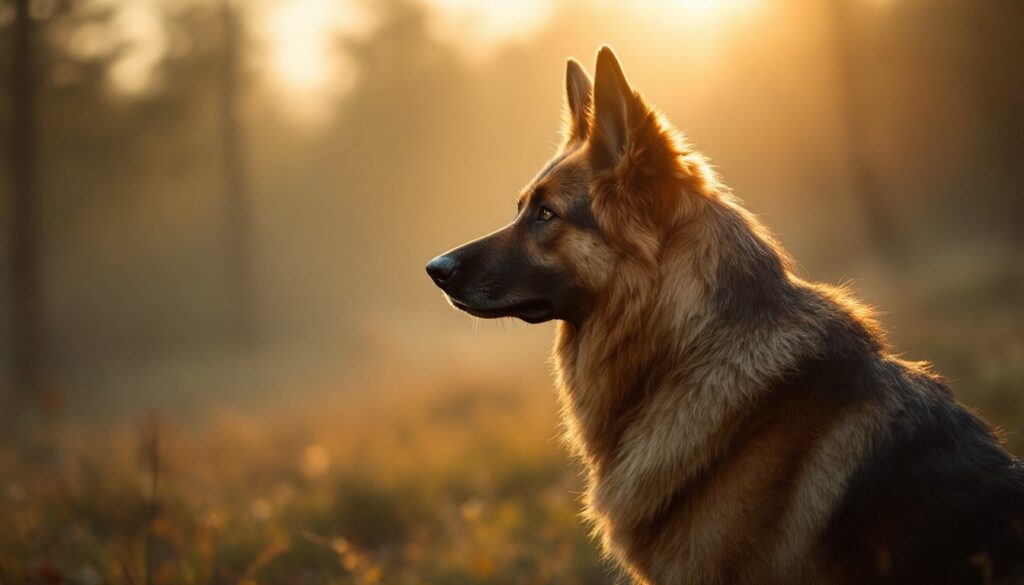
Shiloh Shepherds were developed with health as a priority. Breeders worked to reduce the incidence of hip and elbow dysplasia common in German Shepherds. Their lifespan averages 9-14 years – potentially longer than German Shepherds despite their larger size.
Because they’re bred more for temperament and health than extreme conformation, Shiloh Shepherds often avoid some of the structural issues seen in show-line German Shepherds, like excessively sloped backs.
Is a Shiloh Shepherd Right for You?
Consider a Shiloh Shepherd if you:
- Want a giant-sized dog breeds like German Shepherd
- Need a calmer, more family-oriented temperament
- Prefer a dog with moderate exercise needs
- Can manage a very large dog
- Appreciate the focus on health and temperament in breeding
The Shiloh Shepherd represents one of the best German Shepherd alternatives for families seeking a gentler giant with the impressive appearance of a German Shepherd.
4. Australian Shepherd: The Brilliant Multitasker

While not as visually similar to German Shepherds as the previous breeds, the Australian Shepherd deserves consideration among top dog breeds like German Shepherd due to their comparable intelligence, work ethic, and versatility.
Physical Characteristics
Australian Shepherds are medium-sized dogs, typically weighing 40-65 pounds – making them one of the best breeds like German Shepherd but smaller. They feature a striking medium-length double coat in various colors, including blue merle, red merle, black, and red, often with white markings and copper points.
Their eyes can be blue, brown, amber, or even heterochromatic (different colored eyes). While their ears aren’t erect like German Shepherds, their alert expression and athletic build create a similar impression of intelligence and capability.
Temperament and Personality
Australian Shepherds match German Shepherds in intelligence and trainability but with a different energy pattern. They’re among the most versatile dog breeds similar temperament German Shepherd with:
- Exceptional problem-solving abilities
- Strong work ethic and desire to have a job
- Intense focus and trainability
- Deep bond with their family
- Adaptability to various lifestyles when properly exercised
Unlike some other shepherd dog breeds, Aussies were developed specifically for herding in close partnership with humans, resulting in dogs that are highly attentive to their owners and naturally motivated to work cooperatively.
Training and Exercise Needs
Australian Shepherds rank among the most intelligent dogs in the world, rivaling German Shepherds. They excel in:
- Agility, flyball, and disc dog competitions
- Obedience and rally
- Herding trials and farm work
- Service and therapy roles
- Advanced trick training
Their exercise needs are substantial but different from German Shepherds. They require:
- 1-2 hours of physical activity daily
- Regular mental challenges
- Opportunities to use their herding and problem-solving instincts
Health and Lifespan
Australian Shepherds typically live 12-15 years – notably longer than German Shepherds. They’re generally healthy but can be prone to:
- Hip dysplasia (though less common than in German Shepherds)
- Eye conditions like cataracts and progressive retinal atrophy
- MDR1 gene mutation (affecting drug sensitivity)
- Epilepsy in some lines
One important health consideration: the merle gene that creates their beautiful coat patterns can cause health issues if two merle dogs are bred together. Responsible breeders avoid these pairings.
Is an Australian Shepherd Right for You?
Consider an Australian Shepherd if you:
- Want one of the smartest dog breeds like German Shepherd
- Prefer a medium-sized dog with high intelligence
- Need a dog for dog sports or active family life
- Can provide mental stimulation and regular exercise
- Appreciate their stunning coat colors and patterns
Australian Shepherds represent excellent German Shepherd alternatives for those seeking a highly intelligent, versatile breed in a smaller package.
German Shepherd Mixes: The Best of Both Worlds

For those who love German Shepherds but want something slightly different, German Shepherd mix breeds offer countless possibilities. These crosses often retain many German Shepherd traits while introducing characteristics from other breeds.
Popular German Shepherd Mixes
German Shepherd mix with other breeds can produce some outstanding companions:
- Shepsky (German Shepherd + Husky): Combines the intelligence of German Shepherds with the striking appearance and independence of Huskies.
- Shollie (German Shepherd + Collie): Blends German Shepherd protection with Collie sensitivity and herding precision.
- Sheprador (German Shepherd + Labrador): Often creates a more easy-going, family-friendly dog while maintaining intelligence and trainability.
- King Shepherd (German Shepherd + Malamute and/or Great Pyrenees): Larger than pure German Shepherds with a typically gentler temperament.
- German Sheppit (German Shepherd + Pit Bull): Combines loyalty from both breeds with the enthusiasm and people-orientation of Pit Bulls.
Benefits of German Shepherd Mixes
Mixed breeds often benefit from:
- Hybrid vigor: Generally better health than purebreds
- Moderated traits: Extreme characteristics from either parent breed are often balanced
- Unique combinations: Appearance and temperament traits that give your dog a one-of-a-kind quality
For those seeking dog breeds similar to German Shepherd but with some variation, mixes offer endless possibilities to find the perfect canine companion.
Comparing German Shepherds to Similar Breeds
When considering German Shepherd vs other breeds, it helps to compare specific aspects:
Size Comparison
In a German Shepherd size comparison:
- Belgian Malinois: Slightly smaller and lighter-boned
- Dutch Shepherd: Similar size but typically more moderate build
- Shiloh Shepherd: Significantly larger and heavier
- Australian Shepherd: Noticeably smaller with a more compact build
Temperament Comparison
Among dog breeds similar temperament German Shepherd:
- Belgian Malinois: Higher drive, more intense, potentially sharper
- Dutch Shepherd: Similar protection instincts but often more adaptable
- Shiloh Shepherd: Gentler, less protective, more family-oriented
- Australian Shepherd: Equally smart but more handler-focused, less naturally protective
Health and Longevity
When comparing lifespans of dog breeds like German Shepherd:
- German Shepherd: 9-13 years
- Belgian Malinois: 12-14 years
- Dutch Shepherd: 11-14 years
- Shiloh Shepherd: 9-14 years
- Australian Shepherd: 12-15 years
Training Needs
All these German Shepherd type dogs require substantial training, but with different focuses:
- German Shepherd: Consistent training with clear boundaries
- Belgian Malinois: Intensive training with outlets for high drive
- Dutch Shepherd: Versatile training across various disciplines
- Shiloh Shepherd: Gentle, positive training with emphasis on manners
- Australian Shepherd: Creative, varied training with mental challenges
Finding the Perfect Match for Your Lifestyle
When choosing among dog breeds like German Shepherd, consider these lifestyle factors:
For Active Outdoor Enthusiasts
If you’re highly active and outdoorsy, consider:
- Belgian Malinois: For serious athletes and dog sport competitors
- Dutch Shepherd: For versatile outdoor companions
- Australian Shepherd: For trail running and agility enthusiasts
For Families with Children
Among dog breeds like German Shepherd for families:
- Shiloh Shepherd: Gentle giants with family-oriented temperaments
- Australian Shepherd: Playful, trainable, and adaptable to family life
- Well-bred German Shepherd mixes: Often offer balanced temperaments
For Urban or Apartment Living
If you need breeds like German Shepherd but smaller for urban living:
- Australian Shepherd: Compact size but needs plenty of exercise
- Some German Shepherd mixes: Can be more adaptable to apartment life
- Dutch Shepherd: More moderate size and adaptable temperament
For Allergy Sufferers
If you’re interested in dog breeds like German Shepherd but hypoallergenic, your options are limited, as none of these breeds are truly hypoallergenic. However:
- Poodle mixes with German Shepherd can sometimes be more allergy-friendly
- Belgian Malinois and Dutch Shepherds have shorter coats that may cause fewer problems
- Regular grooming of any breed can reduce allergen levels
Training and Socializing Your Shepherd-Type Dog
All dog breeds like German Shepherd are intelligent working breeds that require proper training and socialization. Follow these guidelines for success:
Early Socialization
Begin socializing your puppy at 8-16 weeks to various:
- People of different ages, genders, and appearances
- Environmental stimuli (sounds, surfaces, objects)
- Other animals and dogs
- Different locations and situations
Positive Training Methods
These loyal dog breeds like German Shepherd respond best to:
- Reward-based training using food, toys, and praise
- Clear, consistent commands
- Regular short training sessions
- Mental challenges that engage their intelligence
Avoiding Common Mistakes
When training German Shepherd type dogs, avoid:
- Harsh corrections or punishment-based methods
- Inconsistent rules or boundaries
- Insufficient exercise before training sessions
- Lack of mental stimulation
Exercise and Mental Stimulation Requirements
All dog breeds similar to German Shepherd need substantial physical and mental exercise:
Physical Exercise
Daily physical needs include:
- 1-2 hours of activity for most shepherd breeds
- A mix of walking, running, playing, and training
- Age-appropriate exercise (gentler for puppies and seniors)
Mental Stimulation
These intelligent dog breeds like German Shepherd need mental challenges:
- Puzzle toys and food-dispensing games
- Training for new skills and tricks
- Scent work activities
- Rotating toys to prevent boredom
Working Outlets
As working dog breeds like German Shepherd, these dogs thrive with jobs:
- Organized dog sports (agility, obedience, tracking)
- Participation in herding trials where available
- Canine good citizen training and therapy work
- Regular training sessions that simulate working tasks
Health Considerations for Shepherd-Type Dogs
When choosing among dog breeds like German Shepherd, consider these health factors:
Common Health Concerns
Watch for these issues in shepherd-type breeds:
- Hip and elbow dysplasia
- Degenerative myelopathy
- Exocrine pancreatic insufficiency
- Allergies and skin problems
- Eye conditions
Preventative Care
Keep your dog healthy with:
- Regular veterinary checkups
- Appropriate vaccination schedules
- Parasite prevention
- Dental care
- Weight management
Nutrition for Working Breeds
These active dog breeds like German Shepherd need:
- High-quality protein sources
- Appropriate calorie levels based on activity
- Essential fatty acids for coat and joint health
- Fresh water always available
- Careful monitoring of weight and condition
Finding a Responsible Breeder or Rescue
Whether purchasing a puppy or adopting a rescue, research is essential:
Responsible Breeders
Look for breeders who:
- Health test their breeding stock
- Raise puppies in enriched environments
- Ask you detailed questions about your lifestyle
- Provide lifetime support for their puppies
- Have verifiable knowledge about the breed
Rescue Options
Consider adoption through:
- Breed-specific rescues for dog breeds like German Shepherd
- All-breed rescues with shepherd-type dogs
- Shelters that evaluate temperament
Conclusion: Finding Your Perfect Shepherd Companion
The German Shepherd sets a high standard for working ability, intelligence, and loyalty. Yet, as we’ve explored, several dog breeds like German Shepherd offer similar qualities with their own unique advantages.
Whether you choose the intense Belgian Malinois, the versatile Dutch Shepherd, the gentle Shiloh Shepherd, or the brilliant Australian Shepherd, understanding their specific traits helps ensure a good match for your lifestyle.
Remember that individual variation exists within any breed. Meeting multiple dogs, talking with experienced owners, and working with responsible breeders or rescues are the best ways to find your ideal companion among these exceptional dog breeds like German Shepherd.
The right match will depend on your specific needs for exercise capacity, temperament, size, and health considerations. Whatever your choice, these remarkable dogs like German Shepherd offer the same core qualities of intelligence, trainability, and devotion that make shepherd breeds so beloved worldwide.
Resources and Further Reading
For more information on dog breeds like German Shepherd, consult these reliable sources:
- American Kennel Club Breed Information
- United Kennel Club Breed Standards
- Federation Cynologique Internationale Breed Classifications
- PetsPump: Complete Guide to Dog Breeds
- PetsPump: How to Choose the Right Dog Food
- PetsPump: Dog Training Basics
By carefully considering the specific traits of these dog breeds similar to German Shepherd, you can find the perfect companion that matches your lifestyle while bringing the intelligence, loyalty, and capability that make shepherd breeds so special.
This article was thoroughly researched to provide accurate, comprehensive information about dog breeds similar to German Shepherds. Always consult with veterinary and training professionals when making decisions about dog ownership.


